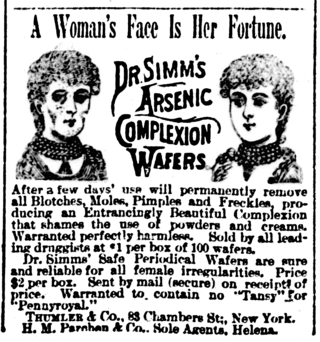
Advertising is the practice and techniques employed to bring attention to a product or service. Advertising aims to put a product or service in the spotlight in hopes of drawing it attention from consumers. It is typically used to promote a specific good or service, but there are wide range of uses, the most common being the commercial advertisement.

The International Chamber of Commerce is the largest, most representative business organization in the world. Its over 45 million members in over 100 countries have interests spanning every sector of private enterprise.
An infomercial is a form of television commercial that resembles regular TV programming yet is intended to promote or sell a product, service or idea. It generally includes a toll-free telephone number or website. Most often used as a form of direct response television (DRTV), they are often program-length commercials, and are typically 28:30 or 58:30 minutes in length. Infomercials are also known as paid programming. This phenomenon started in the United States, where infomercials were typically shown overnight, outside peak prime time hours for commercial broadcasters. Some television stations chose to air infomercials as an alternative to the former practice of signing off, while other channels air infomercials 24 hours a day. Some stations also choose to air infomercials during the daytime hours, mostly on weekends, to fill in for unscheduled network or syndicated programming. By 2009, most infomercial spending in the U.S. occurred outside of the traditional overnight hours. Stations in most countries around the world have instituted similar media structures. The infomercial industry is worth over $200 billion.

Telephone numbers in the United Kingdom are administered by the Office of Communications (Ofcom). For this purpose, Ofcom established a telephone numbering plan, known as the National Telephone Numbering Plan, which is the system for assigning telephone numbers to subscriber stations.

False advertising is defined as the act of publishing, transmitting, or otherwise publicly circulating an advertisement containing a false claim, or statement, made intentionally to promote the sale of property, goods, or services. A false advertisement can be classified as deceptive if the advertiser deliberately misleads the consumer, rather than making an unintentional mistake. A number of governments use regulations to limit false advertising.

Alcohol advertising is the promotion of alcoholic beverages by alcohol producers through a variety of media. Along with nicotine advertising, alcohol advertising is one of the most highly regulated forms of marketing. Some or all forms of alcohol advertising are banned in some countries. There have been some important studies about alcohol advertising published, such as J.P. Nelson's in 2000.
Green brands are those brands that consumers associate with environmental conservation and sustainable business practices.

The Committee of Advertising Practice (CAP) is a British organisation responsible for the UK Code of Non-Broadcast Advertising, Sales Promotion and Direct Marketing, which is the main code of practice for self-regulation of the non-broadcast advertising industry in the UK.
The UK Code of Non-broadcast Advertising, Sales Promotion and Direct Marketing is the rule book for non-broadcast advertisements, sales promotions and direct marketing communications in the United Kingdom. It is written and maintained by the Committee of Advertising Practice (CAP) and administered by the Advertising Standards Authority (ASA). The 12th edition of the CAP Code came into force in September 2010.

The Advertising Association (AA) is a trade association representing advertisers, agencies, media and research services in the UK advertising industry. Its stated aim is to promote the “…role, rights and responsibilities of advertising and its impact on individuals, the economy and society". Its Chief Executive is Stephen Woodford.
Legal advertising is advertising by lawyers (attorneys), solicitors and law firms. Legal marketing is a broader term referring to advertising and other practices, including client relations, social media, and public relations. It's a type of marketing undertaken by law firms, lawyers (attorneys) and solicitors that aims to promote the services of law firms and increase their brand awareness.

Hell Pizza is a New Zealand-based pizza chain. It was established in Wellington (Kelburn) in 1996 and has since expanded around New Zealand.

The Advertising Standards Authority (ASA) is the self-regulatory organisation of the advertising industry in the United Kingdom. The ASA is a non-statutory organisation and so cannot interpret or enforce legislation. However, its code of advertising practice broadly reflects legislation in many instances. The ASA is not funded by the British government, but by a levy on the advertising industry.
Advertising to children refers to the act of advertising products or services to children as defined by national laws and advertising standards.

Nkwenkwe Nkomo of South Africa is the group deputy chairman of FCB SA, South Africa's largest marketing communication group, and chairperson of the Advertising Standards Authority (ASA) of South Africa. He also served as one of 12 elected volunteer members of the World Scout Committee, the main executive body of the World Organization of the Scout Movement. As an anti-apartheid student activist in the 1970s, he was one of the so-called "SASO nine" imprisoned on Robben Island for six years.
The Advertising Standards Authority (ASA) is an organisation that investigates breaches of advertising standards in New Zealand. The ASA provides a free complaints process for consumers about the content and placement of advertisements. In assessing complaints, the ASA apply the ASA Advertising Codes. Key requirements of these codes include truthful presentation and a sense of social responsibility. If a complaint is upheld, the ASA formally request the advertisement is removed or amended. Decisions are released to the media and the public via email and online.
Ad Standards manages the complaint resolution process of the advertising self-regulation system in Australia.
Radiocentre is the industry body for commercial radio in the UK. It exists to maintain and build a strong and successful commercial radio industry. The organisation works on behalf of over 40 stakeholders who operate over 300 licensed radio stations across the UK and represent 90% of commercial radio in terms of listening and revenue.

Commercial Radio Australia (CRA) is the peak body for the commercial radio broadcasting industry in Australia. CRA was formed in 1930 as the Federation of Australian Radio Broadcasters.
Diving regulations are the stipulations of the delegated legislation regarding the practice of underwater diving. They apply within the national territory and territorial waters of a country. In most cases they apply to occupational diving, but in a few cases also to recreational diving. There are exemptions for recreational diving in some cases where it is recognised as a self-regulated industry. Offshore diving is generally outside the scope of diving regulations, and tends to be self-regulated through voluntary membership of industry organisations.











